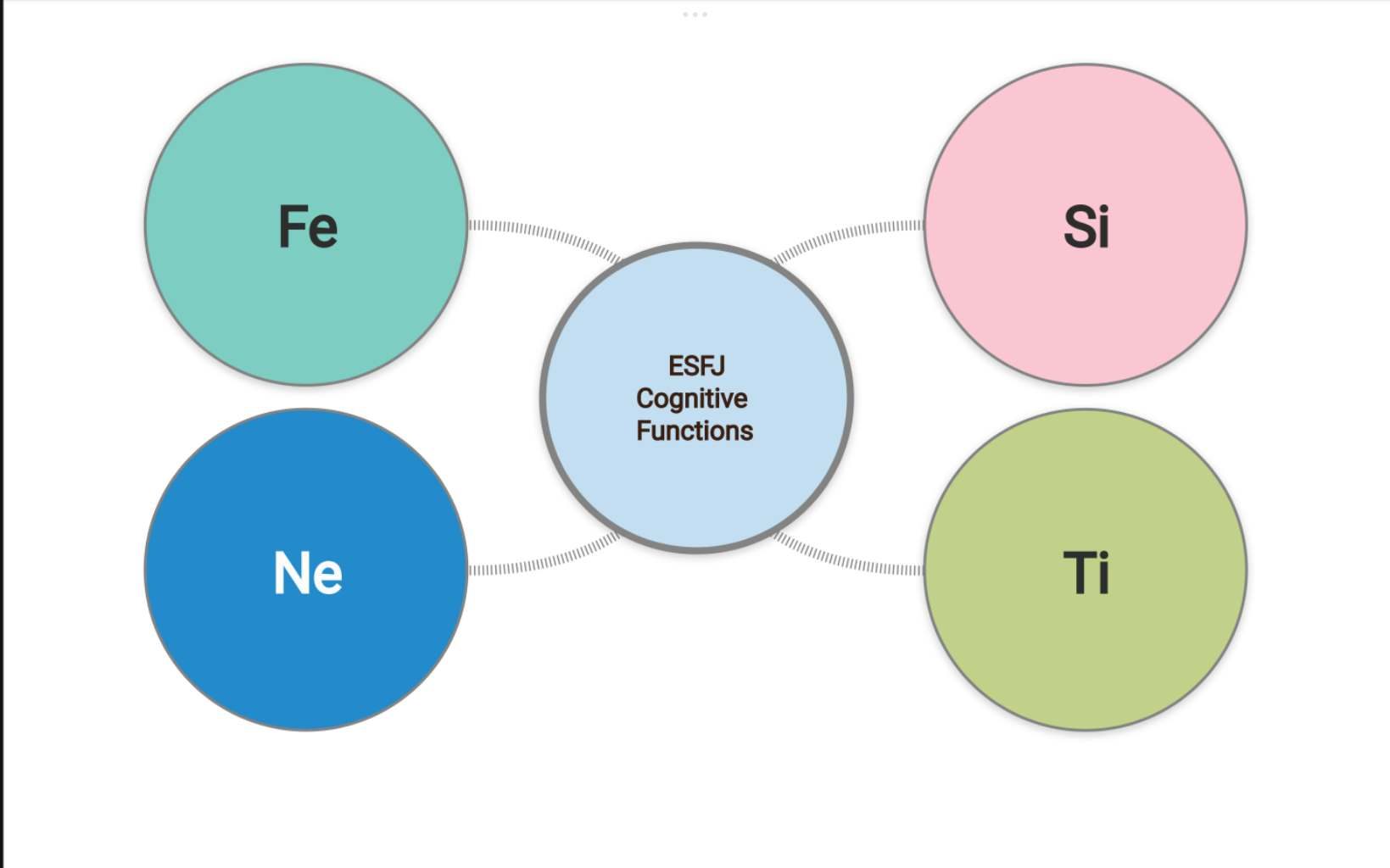Reading Time: 25 Minutes
So, you’re curious about ESFJ Cognitive Functions, huh? Well, you’ve come to the right place. ESFJs are those people who seem to have a sixth sense when it comes to knowing how everyone’s feeling. They’re the ones who always remember your birthday and make sure you’re doing okay. In this article, we’re going to break down what makes ESFJs tick by exploring their cognitive functions. We’ll keep it simple, with just enough detail to make you feel like an expert by the end. Let’s dive in and see what makes ESFJs so special.
Primary Cognitive Functions of the ESFJ
1. Extraverted Feeling (Fe) – The Dominant Function
Extraverted Feeling, or Fe for short, is the top dog in the ESFJ’s mind. It’s like having a built-in social radar, constantly scanning the room to pick up on everyone’s emotions and needs. If you’ve ever met someone who seems to know exactly how you’re feeling before you even say a word, you’ve probably encountered an ESFJ. They have a natural talent for understanding what makes people tick and an even greater gift for bringing folks together. Whether it’s organizing a surprise birthday party or just checking in to see how you’re doing, ESFJs live to make sure everyone is happy and comfortable.
Now, this all sounds pretty fantastic, but there’s a flip side to this coin. ESFJs can sometimes get a little too wrapped up in making everyone else happy. They might bend over backward trying to please others, even if it means ignoring their own needs. They also tend to avoid conflict like it’s the plague, which can lead to bottling up feelings until they burst out later—often at the worst possible time. But hey, nobody’s perfect, right?

2. Introverted Sensing (Si) – The Auxiliary Function
Next up in the ESFJ’s lineup is Introverted Sensing, or Si. This function acts like a library full of personal experiences. ESFJs use Si to recall past events and compare them to what’s happening now. Imagine having a mental scrapbook that lets you flip through all the good times, the lessons learned, and even those embarrassing moments that keep you awake at night. Si helps ESFJs create a stable, reliable environment because they know what works and what doesn’t from past experience.
This makes ESFJs great at remembering details, like your favorite coffee order or how you like your toast just a little burnt. However, their love for the familiar can sometimes make them resistant to change. They might prefer sticking with what they know, even if a new way of doing things could be better. It’s like always ordering the same dish at your favorite restaurant—safe and predictable, but maybe missing out on something new and exciting.
3. Extraverted Intuition (Ne) – The Tertiary Function
Extraverted Intuition, or Ne, is the ESFJ’s creative sidekick, though it’s not as strong as Fe or Si. Think of Ne as a curious little voice in the back of their head, whispering, “What if?” It’s what makes ESFJs occasionally throw caution to the wind and try something new. While their main focus is usually on maintaining harmony and sticking to what they know, Ne gives them the ability to see possibilities and explore new ideas—kind of like dipping a toe into the water before diving in.
You won’t catch an ESFJ daydreaming about a million different future scenarios all the time, but when they do, it’s usually because Ne has decided to make an appearance. This can be refreshing, like when they surprise you with an unexpected but thoughtful gift or suggest a new way of solving a problem. However, because Ne isn’t their go-to function, ESFJs might get a little overwhelmed when they have too many options to consider. It’s like standing in front of a buffet and wanting to try everything, but knowing you can only fit so much on your plate.
4. Introverted Thinking (Ti) – The Inferior Function
Finally, we have Introverted Thinking, or Ti, sitting at the bottom of the ESFJ’s cognitive function stack. Ti is the part of them that occasionally insists on figuring things out logically and making sense of the world in a more detached way. But, for ESFJs, Ti is like that rusty old tool in the shed—it’s there if they need it, but it’s not their first choice.
When ESFJs use Ti, they might dive into problem-solving or organizing their thoughts in a more methodical way. This can be handy when they need to make decisions based on facts rather than feelings. However, because Ti is their weakest function, it can also be a source of stress. They might second-guess themselves or overthink things, especially when they’re trying to be logical in situations that call for a bit of heart.
In other words, ESFJs are much more comfortable leading with their feelings and their sense of tradition than they are relying on cold, hard logic. But when they do tap into Ti, it’s usually because they’re trying to make sure they’ve got all their bases covered—just in case.
You Might Like To Read: ESTJ Cognitive Functions (Te, Si, Ne, Fi) : Deep-dive Analysis of All 8 Functions
The 4 Shadow Functions of the ESFJ
Alright, let’s dive into the shadow side of the ESFJ. Think of these shadow functions like those sneaky little gremlins that show up when you’re stressed out or feeling cornered. They’re not the usual crew, but when they take over, things can get a bit messy. But don’t worry—we all have them, and understanding them is the first step in keeping those gremlins in check.
1. Introverted Feeling (Fi) – The Opposing Role
First up is Introverted Feeling, or Fi, which is pretty much the opposite of ESFJ’s dominant Extraverted Feeling (Fe). While Fe is all about making sure everyone else is happy and getting along, Fi is more like, “But what about me and my feelings?” It’s that voice inside that cares more about personal values and being true to oneself, even if it means going against the crowd.
When Fi pops up for an ESFJ, it’s usually not a comfortable experience. They’re used to focusing on other people’s needs, so when Fi kicks in, they might suddenly feel torn between what they want deep down and what they think they should do to keep everyone happy. It’s like having a little inner rebel saying, “Hey, don’t forget about me!” This can make ESFJs feel guilty or confused, especially if they start thinking, “Am I being selfish?” But in reality, it’s just their way of checking in with themselves—something they might not do often enough.
2. Extraverted Sensing (Se) – The Critical Parent
Next, we’ve got Extraverted Sensing, or Se, which takes on the role of the Critical Parent in the ESFJ’s shadow lineup. Normally, ESFJs are pretty grounded in their past experiences and like to stick with what they know. But when Se gets involved, it’s like suddenly being thrown into the here and now with no warning. Se is all about living in the moment, diving into sensory experiences, and acting on impulse.
When Se comes out to play, ESFJs might find themselves doing things they wouldn’t normally do—like making snap decisions, chasing after something new and shiny, or overindulging in sensory pleasures (think eating a whole cake because it just tastes so good). It’s like having a strict parent in your head suddenly saying, “Go ahead, live a little!” But because it’s not their usual style, ESFJs might feel uncomfortable or even guilty afterward, wondering if they went too far.
3. Introverted Intuition (Ni) – The Trickster
Now, let’s talk about Introverted Intuition, or Ni, which plays the Trickster role for ESFJs. Ni is all about seeing patterns, predicting the future, and sometimes overthinking things to the point of paranoia. But for an ESFJ, who usually likes to focus on concrete facts and experiences, Ni can feel like a sneaky little gremlin that messes with their sense of certainty.
When Ni takes over, ESFJs might start doubting their usual way of seeing things. They could suddenly become suspicious, wondering if there’s something going on beneath the surface that they’re missing. It’s like that moment when you start thinking, “Wait, was that a compliment or an insult?” and then you spiral into overanalyzing every little thing. Ni can also make them feel like they’re walking on shaky ground, questioning decisions they’d normally feel confident about. It’s the Trickster’s way of throwing them off balance and making them second-guess everything.
4. Extraverted Thinking (Te) – The Demon
Finally, we come to Extraverted Thinking, or Te, which plays the role of the Demon in the ESFJ’s psyche. And yeah, it’s as intense as it sounds. Te is all about cold, hard logic, efficiency, and getting things done—no fluff, no feelings, just facts. For an ESFJ, who’s usually more concerned with harmony and making sure everyone’s on the same page, Te can feel like an unwelcome drill sergeant barking orders.
When Te takes over, ESFJs might suddenly become uncharacteristically harsh or critical, laying down the law with an iron fist. It’s like all their usual warmth gets shoved aside, and they become laser-focused on what needs to be done, no matter who gets hurt in the process. They might come off as bossy or overly demanding, which can be a shock to those who know them as the caring, supportive type. Afterward, ESFJs might feel bad about how they acted, but in the moment, Te doesn’t care about feelings—just results. It’s like having a demon whispering in your ear, “Get it done, no matter what.”
ESFJ Cognitive Functions in Relationships
When it comes to relationships, ESFJs are like the glue that holds everyone together. Their top function, Extraverted Feeling (Fe), is all about making sure people get along and feel supported. Imagine having a friend who remembers your favorite ice cream flavor, checks in on you regularly, and knows just how to cheer you up when you’re down. That’s the ESFJ in a nutshell—they thrive on making sure everyone around them is happy and comfortable.
In a social setting, ESFJs use their Fe to pick up on the vibes of the room. They can sense if someone’s feeling left out or if there’s tension between friends, and they’ll jump in to smooth things over before anyone even notices. This makes them great hosts and peacemakers—whether it’s organizing family gatherings or keeping the conversation flowing at a party.
Their secondary function, Introverted Sensing (Si), helps them remember all the little details that make relationships special. They’ll recall your birthday, your favorite movie, and even that embarrassing story you told them once (though they won’t bring it up unless you want them to!). This attention to detail shows how much they care, making others feel valued and understood.
However, ESFJs can sometimes get so caught up in taking care of everyone else that they forget to take care of themselves. They might say yes to things they don’t really want to do, just to keep the peace. And because they avoid conflict like the plague, they might bottle up their own feelings until they can’t hold them in anymore, leading to a surprise outburst later on.
But all in all, ESFJs are the type of people you want in your corner. They’re loyal, dependable, and always ready with a kind word or a helping hand. Just don’t forget to check in on them too—they need support just as much as they give it.
ESFJ Cognitive Functions in the Workplace
In the workplace, ESFJs are the ones who keep the wheels turning smoothly. They’re the team players who make sure everyone’s on the same page and that the work gets done efficiently. Thanks to their Extraverted Feeling (Fe), they excel in roles where they can interact with others, provide support, and help maintain harmony. You’ll often find them in positions like teachers, nurses, or managers—jobs that involve taking care of people and keeping things organized.
ESFJs are natural-born leaders, but not in a bossy or controlling way. They lead by example, showing others how to work together and treating everyone with respect. Their Introverted Sensing (Si) function helps them create structure and stick to routines, which is why they’re often the ones who keep things running like a well-oiled machine. They appreciate clear guidelines and like to follow tried-and-true methods. If something worked well in the past, you can bet they’ll suggest doing it that way again.
But here’s the thing: ESFJs can sometimes struggle with change. If a new approach or a sudden shift in the workplace comes along, they might resist it at first, preferring to stick with what they know. They might also find it challenging to deal with coworkers who don’t share their work ethic or sense of responsibility. After all, they believe in giving 100%, and it can be frustrating when others don’t seem to care as much.
Despite these challenges, ESFJs are the heart of any team. They’re the ones who remember everyone’s work anniversaries, bring in treats for the team, and make sure the workplace feels like a second home. They’re also great at resolving conflicts, often stepping in to mediate and find a solution that works for everyone. And because they genuinely care about their coworkers, they’re the ones who’ll check in on you if you’re having a rough day and offer a listening ear.
So, if you have an ESFJ on your team, consider yourself lucky. They bring dedication, warmth, and a sense of community to the workplace, making it a better place for everyone. Just be patient if they’re a little hesitant about change—once they see the benefits, they’ll come around and help make it work for everyone.
Growth and Development for ESFJs
Growth for ESFJs is like taking a well-organized garden and making it flourish even more. They’re naturally good at taking care of others, maintaining harmony, and sticking to what works. But personal growth often means stepping outside of their comfort zone and trying out new tools in their cognitive toolkit.
One of the biggest areas for growth is learning to embrace change and uncertainty. ESFJs love their routines and familiar ways of doing things, but life isn’t always predictable. By practicing flexibility, they can learn to go with the flow and adapt to new situations without feeling too stressed. This might mean being open to new ideas or ways of doing things, even if it feels uncomfortable at first. The more they practice, the easier it gets, kind of like learning to ride a bike without training wheels—wobbly at first, but smoother with time.
Another area for growth is developing their weaker functions, like Introverted Thinking (Ti). While ESFJs are naturally more comfortable leading with their hearts, learning to balance this with some logical, analytical thinking can help them make more well-rounded decisions. This doesn’t mean they need to turn into robots—just that they might benefit from taking a step back and considering the facts before making a decision based solely on emotions. It’s like adding a pinch of salt to a sweet dish—it brings out the best in everything else.
It’s also important for ESFJs to focus on self-care. They’re so busy taking care of everyone else that they sometimes forget to take care of themselves. Setting boundaries and making time for their own needs can help them recharge and prevent burnout. Think of it like this: you can’t pour from an empty cup, so it’s important to keep your own cup full, too.
Overall, growth for ESFJs is about expanding their horizons, balancing their natural strengths with new skills, and remembering that it’s okay to put themselves first sometimes. With a bit of practice and patience, they can continue to grow into even more well-rounded and fulfilled individuals.
Comparing ESFJ Cognitive Functions with Other Types
Let’s play a little game of “Spot the Difference” with ESFJ cognitive functions and those of other personality types. It’s like comparing apples and oranges—both are great, but they’ve got their own flavors and strengths.
ESFJ vs. ENFJ: Both ESFJs and ENFJs lead with Extraverted Feeling (Fe), which makes them caring, empathetic, and great at building relationships. However, while ESFJs rely on Introverted Sensing (Si) as their second function (sticking to what they know), ENFJs use Introverted Intuition (Ni), which gives them a knack for seeing future possibilities and big-picture thinking. So, while ESFJs might focus on creating a stable, comforting environment, ENFJs are more likely to push for growth and change, aiming for a brighter future.
ESFJ vs. ISFJ: ESFJs and ISFJs both use Extraverted Feeling (Fe) and Introverted Sensing (Si), but in reverse order. ISFJs lead with Si, which makes them more focused on maintaining traditions and recalling past experiences. They’re a bit more reserved and prefer working behind the scenes, while ESFJs are more outgoing and comfortable in the spotlight. Think of ISFJs as the careful planners and ESFJs as the enthusiastic organizers—both are essential, but they approach things from different angles.
ESFJ vs. ESTJ: Here’s where things get interesting. ESTJs, like ESFJs, are also focused on structure and organization, but they lead with Extraverted Thinking (Te) instead of Extraverted Feeling (Fe). This means ESTJs are more about efficiency and getting things done, even if it means making tough decisions. They’re the taskmasters who aren’t afraid to crack the whip, while ESFJs are more focused on keeping the team happy and cohesive. ESTJs say, “Let’s get this done, now!” while ESFJs say, “Let’s make sure everyone’s on board first.”
ESFJ vs. ENFP: ENFPs are like the free-spirited cousins of the ESFJ. While ESFJs are grounded in reality with their Si, ENFPs are all about exploring new possibilities with their Extraverted Intuition (Ne). ENFPs thrive on spontaneity and creativity, often jumping from one idea to the next, while ESFJs prefer a more structured, predictable approach. In a way, ENFPs bring the wild ideas, and ESFJs help figure out how to actually make them work.
In short, while ESFJs share some similarities with other types, their unique blend of cognitive functions makes them stand out in their own special way. They’re the ones who bring people together, create stable environments, and ensure that everyone feels supported—qualities that are invaluable in any setting.
Conclusion On ESFJ Cognitive Functions
And there you have it—everything you need to know about ESFJ Cognitive Functions. ESFJs are the heart and soul of any group, always ready to lend a hand and make sure everyone’s happy. Their unique blend of caring and organization makes them stand out in both personal and professional settings. By understanding their cognitive functions, we can appreciate why they’re such naturals at bringing people together and creating harmony. So next time you’re with an ESFJ, you’ll know exactly what makes them so darn good at what they do.
If you like the post, then please don’t forget to share with your friends.
Some Of The Previous Posts



